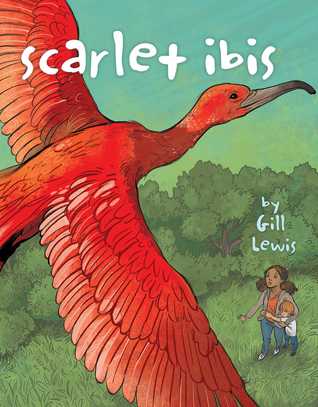 Lewis, Gill. Scarlet Ibis
Lewis, Gill. Scarlet IbisMay 15th 2018 by Atheneum/Caitlyn Dlouhy Books
Public library copy
Scarlet and her brother have a mother who can barely take care of herself, much less them. Luckily, Scarlet prides herself in taking care of her brother, Red, who is on the autism spectrum. When their social worker is due for a visit, she makes sure her mother's medicine is locked up, the apartment is clean, there is food in the refrigerator, and her own room is on the messy side, so it looks like her mother is the one doing all of the work. She understands Red's obsession with birds, and has an arrangement with a neighbor to get into the zoo for free once a month to visit the aviary. Things are going well until her mother falls asleep in bed with a cigarette on a day that Red is home sick from school. They both end up in the hospital, and Scarlet is sent into foster care with Renee's family, including a boy not much older than herself, Jez, who is a great big brother figure for her. Not only that, but the family shares the cultural heritage of the Jamaican father Scarlet hopes to one day meet. Scarlet manages to make friends at her new school, and when they dare her to go into the house of the local "Baba Yaga" who scares all of the children, she does. Surprisingly, she meets a very nice older woman, Mrs. Popescue, who raises a variety of birds. Scarlet starts to visit her, and when she takes Red away from his own foster home, Red stays with Mrs. Popescue for a while after Scarlet's pleading. Of course, this isn't the best thing for Red, and with the help of her foster family and social worker, Scarlet is able to find an acceptable solution to her and Red's living situation.
Strengths: Oh, British parenting! Like the characters in Cathy Cassidy or Jacqueline Wilson books, Scarlet is a fantastic manager who uses her ten pounds a week to keep her family in food, remembers to bleach the toilet, and is absolutely sure that she can hold everything together even with her mum in the hospital! She also settles in to an excellent foster care situation with a sense of relief, even though she wants to visit her mother. I liked that once she got into foster care, the emphasis changed to finding friends, which is a fresh approach for a book on this topic. The occasional illustrations are very attractive.
Weaknesses: There are many things that are a little too easy and coincidental in this book, but it is still a good introduction to a child in the foster care system for children who might have no exposure to this.
What I really think: I'm not wild about the cover, but I think this would be a steady circulator among my students who like books with domestic problems, so I think I will buy it. Reminded me a bit of Durrant's Little Bits of Sky and was an engaging, quick read.


























No comments:
Post a Comment